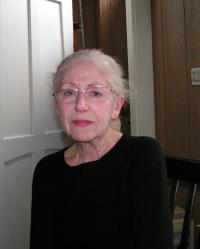“When “liberators” came, they went to buy milk with these cuspidors because they were made from porcelain. And night shirts were dresses for them”

Stáhnout obrázek
Mykhaylyna Ocherklevych was born on the 21st of November 1938 in Lviv. Her maiden name was Mylianyk. Together with parents and brother she lived on Bohomol‘cya Street. It was there, where she was born - accouchement was taken by nun. Father worked in technical college, mother didn‘t work. After war finished the family lived with a fear of deportation to Siberia. In 1955 she finished school, later high school. She worked as a doctor. Later on she married Bohdan Ocherklevych. Mykhaylyna has a daughter. She never left Lviv and now lives here with the family.
